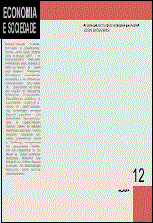Abstract
O artigo trata da trajetória do historiador David S. Landes, centrada em seu último livro, A riqueza e a pobreza das nações (1998), comparativamente ao seu primeiro grande livro, Prometeu desacorrentado (1969), passando pelo seu criativo texto Revolution in time (1983). Recupera-se a explicação central do autor para a primazia inglesa, e dos países da Europa setentrional, no arranque para a industrialização, explicada a partir da superioridade da cultura européia, especialmente na sua valorização da ética calvinista, do trabalho metódico, perseverante e ordenado, condições estas que, auxiliadas pela reforma protestante, dispararam o processo intelectual que levaria ao desenvolvimento científico e tecnológico na Europa. Em conformidade com estes postulados, os processos de industrialização vitoriosos nos Estados Unidos e Japão são analisados por referência àquele paradigma; em contraposição, são historiadas as tentativas frustradas, ou parcialmente realizadas, em outras regiões: na América Latina, em países muçulmanos, na Índia, no Egito. Constatam-se as influências decisivas das conjunturas históricas dos anos 60 e 90 nos escritos de Landes, que, de um autor respeitado por suas posições em relação à exploração do mundo colonial e sua contribuição para o desenvolvimento econômico europeu, passa à defesa desabrida dos países hegemônicos, até o limite de justificar abertamente o imperialismo. O livro, em essência, é um hino ao império da globalização
Abstract
An article on the historian David S. Landes distinctive course, concerning his last work The wealth and poverty of nations (1998), comparatively to his great first work The unbound prometheus (1969), going through his creative text Revolution in time (1983). The author’s central interpretation for the English primacy as well as for the Northern European countries industrialization take off stresses the superiority of European culture, specially in its empowerment of the Calvinist ethics, the methodic work, steady and systematic, conditions which supported by the protestant reform, impelled the intellectual process which would lead to the scientific and technological development in Europe. According to these postulates, the successful industrialization process in the United States and Japan are analyzed in reference to that paradigm; in contraposition the frustrated or partially achieved attempts in other regions are narrated. The decisive influences of historical conjunctures of the 60’s and 90’s in Landes writings are verified; from an author respected by his positions towards the colonial world exploitation and his contribution to the European economic development, he goes on in a sharp defense of hegemonic countries to the limit of openly justifying the imperialism. The work is, substantially, a hymn to the empire of globalization.
Key words: Europe – Industry – History. Globalization; Landes, David S., 1924
References
ALEXANDRE, V. Os sentidos do Império. Questão nacional e questão colonial na crise do antigo regime português. Lisboa: Edições Afrontamento, 1993.
ARRUDA, J. J. A. New patterns of colonial transactions and the industrial revolution: the case of Luzo-Brazilian Empire, 1660-1800. In: BERG, M. (Org.). Oceanic trade, colonial wares and industrial development 1600-1800. [s.l.: s.n.], 1994. p. 212-26. (Papers presented at the Eleventh International Economic History Congress, Milan. – Session C-31). (first draft).
ARRUDA, J. J. A. A grande Revolução Inglesa 1640-1780. São Paulo: Ed. Hucitec/Departamento de História da USP, 1996.
BERG, M. (Org.). Oceanic trade, colonial wares and industrial development 1600-1800. [s.l.: s.n.], 1994. (Papers presented at the Eleventh International Economic History Congress, Milan. –Session C-31). (first draft).
BETHENCOURT, F., CHAUDHURT, K. História da expansão portuguesa. Lisboa: Ed. Círculo dos Leitores, 1998. 5v.
BOUCHON, G. Vasco da Gama. Paris: Ed. Fayard, 1998.
CATROGA, F. Ritualizações da história. In: TORGAL, L. R., MENDES, J. A., CATROGA, F. (Aut.). História da história em Portugal, sécs. XIX-XX. Lisboa: Círculo de Leitores, 1996. p. 611.
ESTEBAN, J. C. Britain’s terms of trade and the Americas, 1772-1832: back to demand as a dynamic factor in British industrialization? In: BERG, M. (Org.). Oceanic trade, colonial wares and industrial development 1600-1800. [s.l.: s.n.], 1994. p. 1-20. (Papers presented at the Eleventh International Economic History Congress, Milan. – Session C-31). (first draft).
FONSECA, L. A. Vasco da Gama. O homem, a viagem, a época. Lisboa: Ed.
EXPO98/Alentejo, 1997.
HILL, C. Intellectual origins of the English revolution. Oxford: Clarendon Press, 192 (1ª ed., 1965).
________. Reformation to industrial revolution. In: ________. The Pelican economic history of Britain. Harmondsworth: Penguin Books, 1969. v. 2: 1530-1780.
LANDES, D. S. Prometeu desacorrentado. Rio de Janeiro: Ed. Nova Fronteira, 1994. (1a ed., Cambridge University Press, 1969).
________. Revolution in time: clocks and the making of the modern world. Cambridge: Harvard University Press, 1983.
________. What do bosses really do. Journal of Economic History, v. 46, n. 3, p. 585- 623, Sept. 1986.
________. The fable of the dead horse; or, the Industrial Revolution revisited. In: MOKYR, J. (Ed.). The British Industrial Revolution: an economic perspective. Boulder: Westview, 1993. p. 132-70.
________. What room for accident in history? Explaining big changes by small events. Economic History Review, v. 47, n. 4, p. 637-56, 1994.
________. Some further thoughts on accident in history: a reply to Professor Crafts. Economic History Review, v. 48, n. 3, p. 599-601, 1995.
________. A riqueza e a pobreza das nações. Rio de Janeiro: Ed. Campus, 1998. (1a ed., W.W. Norton & Company, 1998).
MACEDO, J. B. Problemas de história da indústria portuguesa no século XVIII. Lisboa: Ed. Associação Industrial Portuguesa, 1963.
O’BRIEN, P. K., ESCOSURA; L. P. 1a (ed.). The costs and benefits of European imperialism from the conquest of Ceuta, 1415, to the Treaty of Lusaka, 1974. Revista de História Econômica, v. 16, n. 1, inv. 1998 (número especial). Ed. Fundación Empresa Pública/Marcial Pons (Twelfth International Economic History Congress, Madrid, 1998).
PEDREIRA, J. Estrutura industrial e mercado colonial, Portugal e Brasil (1780-1830). Linda-a-Velha, 1994.
SUBRAHMANYAN, S. The career and legend of Vasco da Gama. Cambridge: Cambridge University Press, 1997.
VERLINDEN, C. Prince Henry in modern perspective In: WINIUS, G. D. (Ed.). Portugal, the Pathfinder. Madison, 1995. p. 81-87.
WINIUS, G. D. (Ed.). Portugal, the Pathfinder. Madison, 1995.
A Economia e Sociedade utiliza a licença do Creative Commons (CC), preservando assim, a integridade dos artigos em ambiente de acesso aberto.

